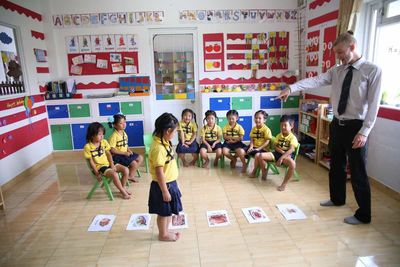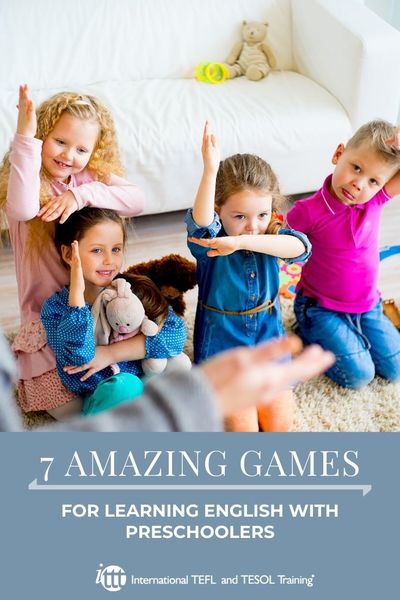7 Amazing Games for Learning English with Preschoolers

Today, as English teachers, we have better equipment and materials, improved teaching methods and techniques, endless ideas and tips on how to maintain discipline and keep our students motivated. Sounds impressive, doesn't it? It seems that we should just enjoy our classes and drink some nice tea during the breaks. However, along with all these improvements come greater demands. Each year more and more parents would like their children to learn English to ensure a better future. In our time, knowledge of English no more is your advantage, but the number one requirement for a good position. That is why our students are getting younger, sometimes to a point when they don't even speak their native language.
Table of Contents
1. London Bridge is falling down.
4. Have you heard about Dobble?
Are you ready to teach English?
The first and the main difference between young learners and adults is that children lack motivation in the beginning. They didn't come to learn English, because they think it will help them to get the position of a manager in an international company or to travel to different countries. They simply were brought to the classroom by their parents with a promise of candy or a new toy if they will behave themselves. In addition, they have shorter attention spans and a great amount of energy. And from this point and on one of the main teacher's properties is to constantly keep kids motivated to learn English.
A typical English lesson for very young learners doesn't have a sign of grammar worksheets or articles from famous magazines. It's full of songs, videos, and games. Here comes one more important thing – a balance between activities and discipline. If you just stick to flashcards and keep you, students, on one spot the whole lesson, eventually they will get bored and lose their desire to learn. On the other hand, too many active games will result in a full force tornado in the classroom.
How to find this essential balance?One of the best ways, in my opinion, is to use activities that can be easily modified by following the current needs and different levels of students. Moreover, why not to use games that kids are familiar with.
What about adopting a few of our favorite games? Here are some examples of teaching phonics, vocabulary or sentence structure to young learners.
1. London Bridge is falling down.
One of the most famous games we all have played once we were kids. Create an arch with one of the kids and have others lined up to walk under the arch while singing 'London Bridge is falling down, falling down'. After repeating the rhythm two or three times drop your hands to catch one of the children.
Now, you can ask the 'victim' to answer the question. From here, you can choose the content and kinds of questions. For example, you can have flashcards and ask them 'What's this?/What do you see?/ What color is it?' and so on. After receiving a correct answer form an arch with this kid to begin from the start. This activity can be used for reviewing materials or after the study phase to get kids a bit entertained.

2. What's missing?
I think this is the most common game among teachers. Ask kids to sit down in front of you and place some flashcards or objects in a row. Make a short review and a demonstration of the game, then ask children to close their eyes. Take one of the objects (place it behind you) and ask 'What's missing?'. When kids will be familiar with the game, you can invite them one by one to conduct the game with your help.
The first kid comes to you and asks others 'Close your eyes', then chooses one object to hide, asks 'Open your eyes. What's missing?'. Make sure you ask different kids to participate, so everyone can practice. To make this game more active you can practice actions. Have your students standing in the circle and prepare a piece of cloth. You give such commands 'Jump, jump, jump (run, hop, skip…). Stop! Close your eyes. Sit Down!' and cover one of the kids with a cloth. Then kids open their eyes and you ask 'Who is missing?'. When they name a kid you can ask additional questions, for example, "Is Jack a boy or a girl?".
3. Guessing game.
This one is always welcomed by students because it's fun! The simplest version is to have one kid standing next to you and facing others, so only he/she can see what's on the flashcards you hold in front of him. With the help of gestures, kids have to show others words from the flashcards. This game is great to review animals, vehicles, clothes or actions. To make it more difficult you can instruct children to use words and sentences.
4. Have you heard about Dobble?
It's a popular game with different pictures on cards and with only one same picture on every two cards. The second name is 'Spot it'. There are different sets of cards you can buy, however, it's very easy to make it yourself according to your topic. You can make and print it out or even just make slides in PowerPoint, which are divided into two parts with only one the same picture on both sides. The question for this game is 'What's the same?'.

5. Rolling dice.
Here again, you can turn on your imagination. When I started teaching in my school, I just used a square box and later the school bought a big one on Taobao (was rather cheap). On each side, I stuck pictures of words we have learned with kids. This game is suitable for all topics you can think about. For beginners, it can be numbers, colors, body parts, animals and so on with a question 'What's this?/What do you see?'. For a higher level, kids prepare more questions, for example for body parts you can ask 'What are these? – They are fingers? – How many fingers do you have? – I have 10 fingers?'; for fruits, it can be 'What's this? – It is a lemon. – Is it sweet? – No, it is sour.'.
For the summary lessons, we use dice to play a maze game. This needs a bit more preparation and time to play, but it's great for reviewing. You place flashcards one after another on the floor all over the room. You also can add question cards and 'bombs' (cards with additional exercises like 'stand on one leg' or 'jump to the next card'). Kids take turns to roll a die, call the number and move to the next spot to name the flashcard or answer the question.
6. Musical chairs.
I think this game we use even at parties or other events. All you need, are chairs and a song (I use 'Walking, walking' or 'Walking in the jungle'). Place the chairs in the circle in the middle of the classroom back to back. Remember to take one away, so it would be one less than the number of kids. Ask kids to go around the chairs while the song is paling. When you put the song on the pause, kids have to sit down on the chairs. The one who is left has to answer the question.
7. Pass the ball.
This one is not such an active game, but great for practicing songs. Ask your students to sit in a circle and pass a ball (sometimes I change it to plastic fruits, but can be anything you like as long as it is light and small) while the song is playing. When the music stops, the kid with a ball should answer a question. When my students are well aware of how to play, I ask them to sing with me. Here you can choose any song, so better to pick up one that is connected to the lesson's topic.
Are you ready to teach English?
Teaching young learners might be quite challenging, but once you catch their interest - you will be rewarded with their attention and progress. Make your lessons more entertaining and effective by using different activities! I am sure these game ideas will be useful for you, adjust them to different levels of your students and your lessons will be a huge success.
Apply now & get certified to teach english abroad!
Speak with an ITTT advisor today to put together your personal plan for teaching English abroad.
Send us an email or call us toll-free at 1-800-490-0531 to speak with an ITTT advisor today.
Related Articles:
- Top 10 Cities in Latin America with the Highest Demand for English Language Teachers
- 10 Questions You Need to Ask Before Enrolling In a TEFL Course
- 4 Reasons Why Argentina is a Great Place To Teach English Abroad
- Online or In-Class - Which TEFL Course Should You Take?
- Teaching English Abroad: What's Next? - How To Advance In Your EFL Career
- The Top 5 Places to Teach English in Brazil




